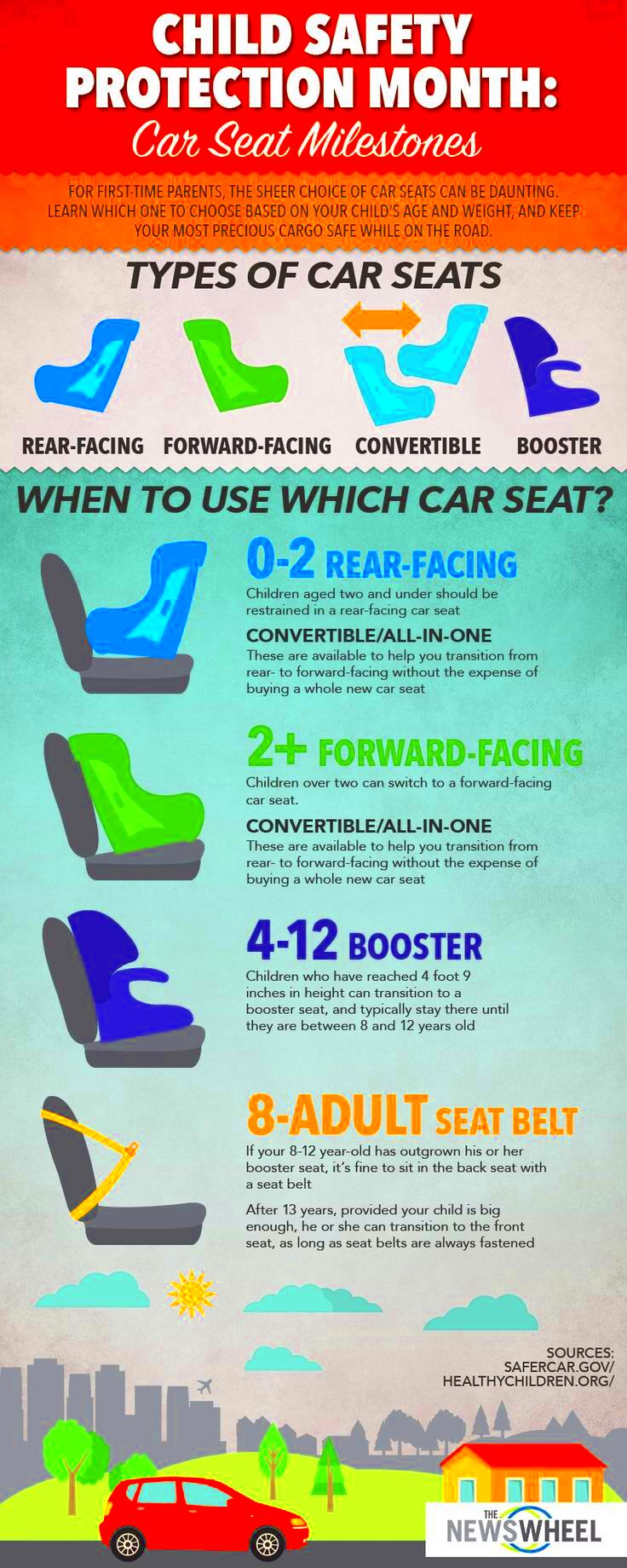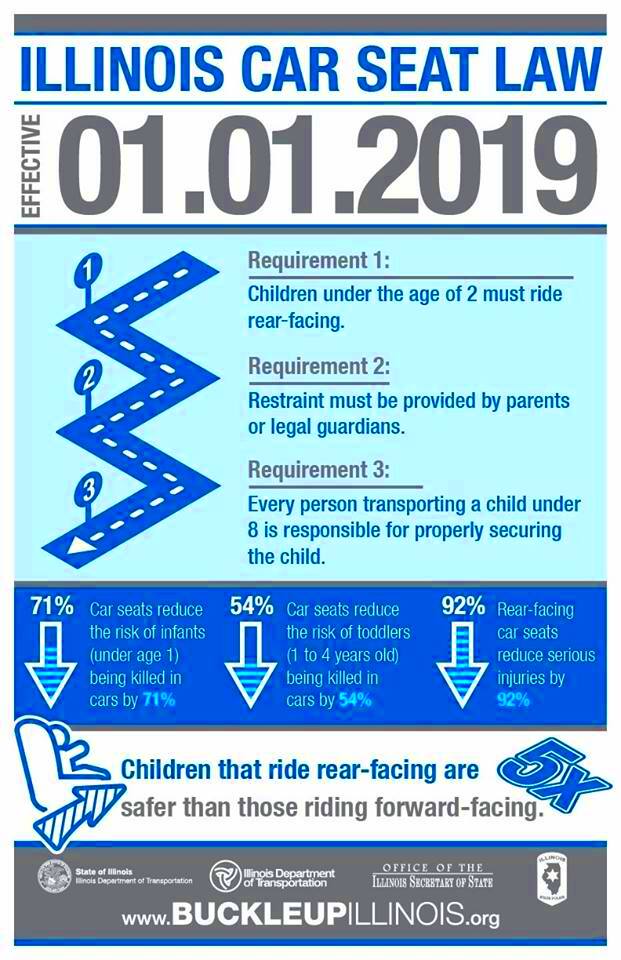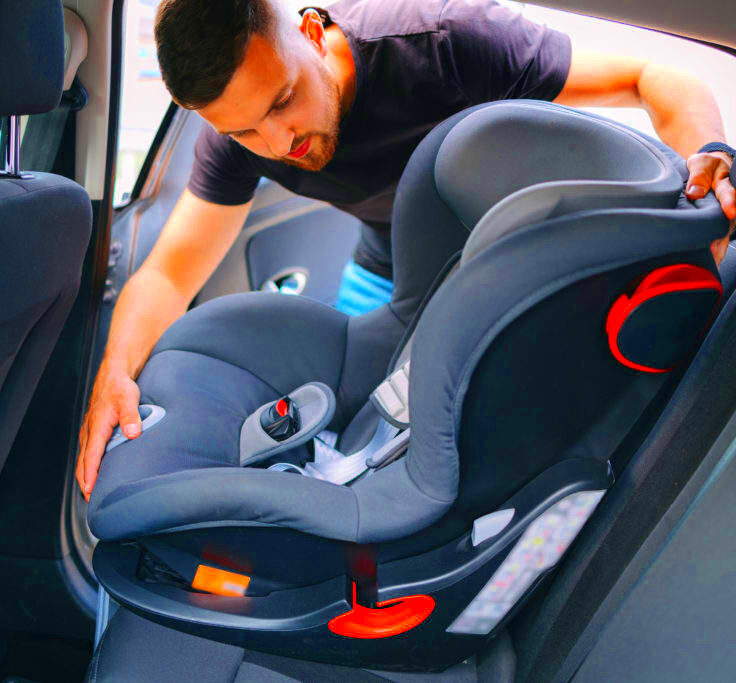Car Seat Laws in Illinois for 2023 What You Should Know
Illinois has implemented strict car seat laws to ensure the safety of children while traveling in vehicles. These laws are designed to protect children from severe injuries in case of accidents by making sure they are securely restrained in age-appropriate car seats. As of 2023, the state mandates that children under the age of 8 must be secured in a child safety seat system, which includes car seats and booster seats. The goal of these laws is to minimize risks and promote road safety for all passengers, especially the youngest ones.
Types of Car Seats Required Based on Age and Weight

The type of car seat required for a child varies depending on both their age and weight. It is crucial to follow these guidelines to ensure your child’s safety:
- Infants (0-12 months): Must use a rear-facing car seat.
- Toddlers (1-3 years): Should continue using a rear-facing seat until they reach the seat’s maximum height and weight limit.
- Preschoolers (4-7 years): Can transition to a forward-facing car seat with a harness once they outgrow the rear-facing seat.
- School-aged children (8-12 years): Should use a booster seat until they are big enough to use a regular seatbelt properly.
It’s important to follow the manufacturer’s specifications regarding weight and height limits to ensure the car seat fits your child properly.
Rear-Facing vs Forward-Facing Guidelines

There is often confusion about when to switch from a rear-facing car seat to a forward-facing one. The general rule is to keep your child in a rear-facing seat as long as possible, as this is the safest position for protecting the head, neck, and spine during a crash.
| Rear-Facing Guidelines | Forward-Facing Guidelines |
|---|---|
| Children should remain in a rear-facing seat until they reach the seat’s height or weight limit, typically around 2-4 years old. | Once a child has outgrown the rear-facing seat, they can transition to a forward-facing seat with a harness, usually between 3-7 years old. |
Always consult your car seat’s manual for exact height and weight restrictions to ensure your child remains safe while traveling.
Booster Seat Requirements for Older Children
As children grow, they eventually outgrow their forward-facing car seats, but they aren’t quite ready for the regular seatbelt. That’s where booster seats come in. Illinois law requires children to use a booster seat until they are at least 8 years old, but age alone isn’t the only factor. The seatbelt must fit properly, which is where the booster seat plays a key role in adjusting the child’s position so that the belt offers the best protection.
Here are the key requirements for using a booster seat:
- Age: Children between the ages of 4 and 8 typically require a booster seat.
- Height and weight: Booster seats are recommended until a child reaches a height of 4 feet 9 inches, regardless of age.
- Types of booster seats: There are two types—backless booster seats and high-back booster seats. A high-back booster is ideal if your vehicle has low seatbacks or no headrests.
Always make sure the booster seat raises the child high enough so the lap belt fits snugly across the upper thighs and the shoulder belt rests comfortably across the chest. This positioning ensures maximum protection in case of an accident.
When Can a Child Use a Regular Seatbelt?
Transitioning from a booster seat to a regular seatbelt is a significant milestone, but it’s essential to ensure the seatbelt fits properly to offer adequate protection. In Illinois, children can start using a regular seatbelt once they meet certain physical criteria, not just an age requirement. This ensures they remain safe even as they grow older.
Here’s when a child can switch to a regular seatbelt:
- Height: A child should be at least 4 feet 9 inches tall for a seatbelt to fit correctly.
- Proper fit: The lap belt should lie snugly across the upper thighs, not the stomach. The shoulder belt should rest comfortably across the chest and shoulder, not the neck or face.
- Positioning: The child should be able to sit with their back against the seat and knees bent comfortably over the edge of the seat.
It’s also essential to ensure that children under 13 remain in the back seat, as this is the safest place for them to travel.
Penalties for Violating Car Seat Laws in Illinois
Failure to comply with Illinois car seat laws can result in penalties. These laws are in place to protect children, and the state takes violations seriously. If a child is not properly restrained in a car seat or booster seat, the driver could face fines and other consequences.
Here are the typical penalties for violating car seat laws:
- First offense: A fine of $75, but this fine can be waived if the driver provides proof of acquiring an appropriate child safety seat and completes a safety course.
- Subsequent offenses: A fine of $200 for each subsequent violation.
- Additional consequences: Multiple violations could result in increased insurance premiums or other penalties, depending on the severity of the case.
To avoid these penalties, it’s always best to ensure children are properly restrained according to their age, weight, and height, and to regularly check that car seats and booster seats are installed correctly.
Exceptions to the Car Seat Requirements
While Illinois has strict car seat laws in place, there are a few exceptions to the general rules. These exceptions are usually based on specific situations where it might be impractical or impossible to use standard car seats or booster seats. It’s important to be aware of these exceptions to ensure you’re still complying with the law while keeping safety a top priority.
Here are some common exceptions:
- Medical conditions: Children with certain medical conditions may be exempt if they cannot safely use a car seat. However, a written statement from a doctor is typically required as proof.
- Taxis and rideshare services: In Illinois, taxis and rideshare services like Uber and Lyft are not required by law to provide car seats. However, parents are encouraged to bring their own car seats to ensure their child’s safety.
- School buses: Traditional school buses are exempt from car seat laws due to their specific design, which includes built-in safety features.
- Emergency situations: In the case of emergencies where a car seat is not available, common sense should be applied, but these situations are considered exceptions.
Despite these exceptions, it’s always best to err on the side of caution and use a car seat whenever possible to ensure your child’s safety.
How to Ensure Car Seats are Installed Properly
Proper installation of a car seat is just as important as using the correct type. Even the best car seat won’t protect your child if it’s not installed correctly. Unfortunately, many parents unknowingly install their car seats incorrectly, which can put their children at risk in an accident.
Here are steps to ensure your car seat is installed properly:
- Read the manual: Always read both the car seat manual and your vehicle’s manual to understand how to secure the seat correctly.
- Use the right anchors: Car seats have two ways to be secured—either with the vehicle’s seatbelt or with the LATCH (Lower Anchors and Tethers for Children) system. Make sure you use one method properly, not both.
- Check for tightness: After installation, the car seat should not move more than an inch from side to side or front to back.
- Ensure proper angle: For rear-facing seats, ensure the seat is at the correct recline angle, typically indicated on the seat. This helps support the baby’s head and neck properly.
If you’re unsure, consider visiting a local car seat inspection station or a certified technician for help. Many local fire departments and hospitals offer free car seat inspections to ensure everything is installed correctly.
FAQ about Car Seat Laws in Illinois
Parents often have questions about car seat laws and how to ensure they’re following the rules while keeping their children safe. Here are some of the most frequently asked questions about car seat laws in Illinois:
- At what age can my child stop using a car seat? In Illinois, children must use a car seat or booster seat until they are at least 8 years old. However, it’s also important that they meet height and weight requirements to transition safely to a seatbelt.
- Can I use a second-hand car seat? It’s not recommended unless you know the seat’s full history. If the car seat has been involved in an accident or has expired, it may no longer offer adequate protection.
- Are there penalties for not using a car seat? Yes, violations of the car seat laws can result in fines starting at $75 for the first offense and $200 for subsequent offenses.
- Do car seat laws apply in rideshare vehicles? Car seat laws apply to personal vehicles, but rideshare services are not required by law to provide car seats. Parents should bring their own to ensure safety.
If you have further questions, it’s a good idea to check with local authorities or consult a child passenger safety technician to make sure you’re compliant with the latest laws and best practices.
Conclusion on Car Seat Safety in Illinois
Car seat safety is crucial in protecting your child while on the road, and following Illinois’ laws helps ensure that children are properly secured based on their age, height, and weight. By using the right type of car seat, transitioning appropriately as your child grows, and ensuring proper installation, you can greatly reduce the risk of injury in case of an accident. Staying informed about the latest laws and recommendations will keep your child safe and help you avoid penalties. Safety should always be a priority, no matter how short or long the trip is.


